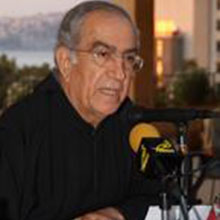
Original Name: Tanios Mouannes.
Father’s name: Elias
Mother’s name: Nemnom Abou Rjeili
Birthday: Born in Chbaniye, High Metn, on March 15, 1938.
Diocese: Diocese of Antelias / Order: Lebanese Maronite Order
Address: Catholic Media Center – Jal El Dib
He is holder of a large number of orders and recognitions, including:
Legion of honor for the order of knight from the Republic of France in 1993.
Order of Academic Palms for culture from the Republic of France in 2002.
Kamal El Murr Award..
He received his elementary education at Chbaniye School before moving to the classes of the Maronite Order, and then setting on a journey which expanded over the twentieth century and was crowned by unlimited giving to Lebanon, the homeland and the message, to its culture and community, and woven by a just service which is derived from the spirit of the Gospel and the virtue of complete surrender to the divine truth, heavenly will and Christian doctrine which is open to the prospects of the era and disciplined within the frame of constructive traditions and noble and high Maronite customs.
His elementary education was in Chbaniye between 1942 and 1953, and secondary education in Kaslik between 1954 and 1957. He obtained in 1960 the Baccalaureus – 1st part – degree in philosophy.
During his youth, Mouannes saw his country removing the robe of mandate and embracing the robe of independence and was deeply touched by this transition, which pushed him towards having the national values deeply rooted in him and towards venerating national wealth, and Lebanon’s particularity and characteristics.
The stage of independence had a pivotal role in the life of Mouannes, as on one side, it made him delve deep inside the Lebanese cultural sentiment, and on the other side, take the road of renaissance, and the leadership of thoughts, science and culture, believing that real independence can only be completed by freeing the mind and logic.
His choice of joining the Lebanese Order contributed in adding a touch of spatiality, seriousness and commitment to principles and values to his choices in the future.
He started his university specialization in an era in which the Lebanese University turned into a gate through which all global intellectual currents started entered, and which was affected by all ideologies which sprouted on the ruins of World War II.
His university studies were pursued between Lebanon and France.
He studied philosophy and theology in the Holy Spirit University of Kaslik and obtained a teaching diploma in philosophy in 1965 and a teaching diploma in theology in 1967.
He moved to the University of Strasbourg in France to pursue his specialization and complete, respectively:
Diploma of Higher Studies of Linguistics in Ontology in 1970.
Diploma of Higher Studies in Ontology in 1970.
Doctorate in Sociology and Anthropology in 1971, the title of his thesis was: Components of the Lebanese Personality.
In addition to his mastering of Arabic, English, French and German languages, Mouannes delved into the ocean of human civilization and became a reference whose research and studies are relied on in revealing the depths of Ontology and history and solving the mysteries of human civilization and the reality of the pulse of the contemporary society.
Mouannes taught in the Lebanese University and the Holy Spirit University of Kaslik and he nurtured generations of college men and women who contributed in activating the movement of renaissance in Lebanon and freeing it from war, underdevelopment and decadence.
The subjects that he supervised the teaching of are:
Theology and Anthropology, Religious Sociology, Church and Media, Messages of the Pope and contemporary transformations, Sects and the Church, Anthropology and Liturgy, Social Research Methods and Other..
From the university teaching positions occupied by Fr. Mouannes, we mention:
Professor of Sociology and Anthropology at the Lebanese University 1972 – 2001.
Professor of Sociology and Anthropology at the Holy Spirit University of Kaslik 1972 – 2003.
Professor of Mass Media and Communication Science in Kaslik.
Professor of Psychology Department at the Faculty of Letters in the Lebanese University.
Head of the Anthropology laboratory at the Social Sciences Institute in the Lebanese University.
Mouannes added to Lebanese university curricula a new pioneer spirit which became the address for a reform movement which exceeded the Lebanese borders to inspire the Eastern Intelligentsia and Arab university administrations.
His monastic life is a mixture of a presence in the midst of the Lebanese scene and a transition within liberation from the constraints of the complex and pressing reality towards the prospects of the promising and vibrant future.
Before the outbreak of war, he took over the presidency of Beit Chabab Institute in 1972. This edifice turned into a place of comfort for every injured, wounded and victim, and one of the symbols of true popular resistance.
Later on he presided over the Monastery of Saint Joseph (Mar Yusuf) Al-Bourj in Dbayeh between 1986 and 1988 and offered guidance at the Palestinian refugees camp in the town during the same period.
Throughout the period of war, Mouannes’s name became prominent in the field of education and scientific and intellectual renaissance; he even merited the confidence of the Maronite church who entrusted him with the mission of being the Director General of the Schools of the Lebanese Maronite Order between 1995 and 1999.
The Maronite Church also chose him to be the President of Holy Spirit University of Kaslik between 1999 and 2002 and thus he led this ancient scientific venue towards the future and became its first president in the twenty-first century.
Moreover, Mouannes takes credit for the establishment of the Faculty of Fine Arts in the Holy Spirit University. He was the dean of the faculty over two stages, at first between 1975 and 1986, and later on between 1993 and 1995.
He also established the Faculty of Medicine, Faculty of Engineering and Informatics and the Environment Institute.
He was also Dean of the Faculty of Letters at Holy Spirit University of Kaslik in 1978 and 1988. He was also appointed as dean on the Faculty of Agriculture at the said university for the first time between 1980 and 1995 and the second time between 1995 and 2000.
Mouannes worked from his positions for the purpose of achieving correct scientific development and the advancement of thought and saving the community, especially the elite in it, from neglect, underdevelopment and deprivation, rendering the university venue a bridge to cross over towards modernity and keeping up with technology, monitoring every new addition from contemporary science.
He still has a big impact on the renewal of curricula, the development of teaching methods and the strengthening of the university’s role and position in the country’s journey.
Moreover, he worked on establishing branches for the university in Bekaa (Zahle), the North and South, for the purpose of keeping students in their own environment, thus saving for them money and facilitating for them access to education as means of advancement of the entire country.
In addition, Mouannes concluded ones of the most important academic conventions with western and Arab universities and established academic cooperation, exchange of professors, students and research.
Mouannes presided over the Churches Architecture Department in the Maronite Liturgical Commission.
Today he occupies the positions of Secretary General of the Episcopal Commission for Mass Media, President of the Press Department, and member of honor in the World Catholic Press Association, he also presides over the Catholic Media Center and had created and prepared many religious programs which were broadcasted by TV stations and radios, especially Télé Liban and the Lebanese Broadcasting Corporation, namely the program “Yawm El Rab” (the day of the Lord) which was followed by a wide section of the population and this was never witnessed before for any of the other Christian religious programs.
Fr. Mouannes’s archive contains more than 52 TV, theater and documentary works, namely: The Glory of Lebanon was given to him (مجد لبنان أعطي له), Lebanon despite all (لبنان بالرغم من كل شيء), the Holy Valley (الوادي المقدس), Isaiah (اشعيا), Joseph (يوسف), The Prodigal Son Today (الابن الشاطر اليوم), Paul (بولس), Sidon under fire (صيدا على لبيب النار), The Day Gallows Were Hung (يوم علقت المشانق), and other materials which are printed.
We also note Fr. Mouannes’s participation in the acting of the movie “Saint Charbel” along with Rida Khouey and Nabih Abou El Hesen.
He is a member of the Universal Catholic Press Union (U.C.I.P.) in Geneva, the Universal Union of Unda in Brussels (U.N.D.A.) and the International Catholic Organization for Cinema (O.C.I.C.).
He presided over the Press, Cinema and Television Branch at the Catholic Media Center in 2002 and was appointed during the same year as Secretary General of the Episcopal Mass Media Commission.
He took part in many seminars and gave lectures in different topics, addressing all citizens with objectivity and surpassing all psychological, political and confessional obstacles.
Researches published by him enriched the Lebanese library with their ideas.
Pr. Youssef Mouannes has a comprehensive philosophic vision which was based on a deep and transparent human expertise and a knowledge which relied on science, acquisition of information and direct contact with the philosophers and intellectuals of the era.
Mouannes participated in all French speaking philosophers conferences and anthropology scientists, French speaking religious sociology scientists and conferences of ontology and U.C.I.P. conferences in his capacity as member of the U.C.I.P. universal office.
In the silence of the Holy Spirit, Fr. Pr. Youssef Mouannes spoke with the human of the twentieth century, dispelling his concerns, refreshing his faith and speaking to the divine child sleeping in his innermost depth.
He is a man of giving to the extreme, he flows with unlimited love.
In his enlightened mind, we find embodied the reality of our presence within this era, and in his writings a symphony in which an angelic spirituality coincided with echoes of a trouble human reality, which Mouannes drew with firmness, wisdom and objectivity on parallel lines which combine on their ends the world of mortality with the prospects of life renewed by the grace of the Lord.

